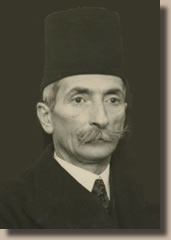
|
| Home | Biography | Publications | Documents & Photos | Contact | ||
APPENDIX 3AHMAD HILMI PASHA
Ahmad Hilmi Abdelbaqi Pasha (1882 - 1963), as his full name goes, has played a distinguished political, economic and humanitarian role in the evolution of the Palestine Question. He also played some significant military roles in the quest to save Arab Palestine and defend it since the beginning of the last century. His involvement in Arab nationalist causes actually started when the region was still part of the Ottoman Empire, and specifically when he participated in the defence of Iraq and Greater Syria against British occupation. Hilmi Pasha, as he is commonly known, actually commanded a group of volunteers and fought alongside the Ottoman forces which succeeded in defeating Major-General Charles Townshend at the battle of Kut El-Emara (Not Kut El-Amara) in Iraq in 1915 during the First World War. When Emir Faysal Bin Al-Hussein (His role was played by Sir Alec Guinness in the film classic “Lawrence of Arabia”) became ruler of Syria, he appointed Hilmi Pasha as Director General of the Ministry of Finance. Hilmi Pasha kept this position until Damascus was occupied by French forces. He then went to Amman, where the Sharif Hussein Bin Ali (the Sharif of Mecca) appointed him Inspector of the Hejaz Railway (The same railway which provided exciting action sequences in the same film.) In 1930 he participated in founding the Arab Bank in Palestine, then the Agricultural Bank, then the Nation’s Bank and finally the Arab Nation Bank in 1940. The chief purpose of the last three banks was to make funds available to Palestinian farmers to enable them keep their lands, which the Jewish Agency was trying to acquire with the help of the British administration of Palestine. In order to decapitate Palestinian intelligentsia and leadership especially during the Great Revolt of 1936-1939, the British mandatory authority exiled Hilmi Pasha to the Seyshelles islands in the Indian Ocean along with the other members of the Arab Higher Committee, namely Dr. Hussein Fakhri Al-Khalidi, Yaaqoub Al-Ghossein, Fouad Saba and Rashid Al-Haj Ibrahim.48 In 1948 King Abdallah I of Jordan appointed him Military Governor of Jerusalem. At that time he was the only senior Palestinian leader physically present in the city. Besides, he had already taken it upon himself to organize the city’s defence. The chief Palestinian leader, namely the Mufti of Palestine Haj Amin Al-Husseini, was on the run from the British outside Palestine. When the Arab League created the All-Palestine Government 49 in Gaza on September 23, 1948 and appointed Hilmi Pasha as its first Prime Minister, King Abdallah I immediately relieved him from his duties. The King was vehemently opposed to this government, which he suspected of having been created by the Arab League and his opponents among the Arab leaders so that he does not take over the city of Jerusalem. He was also convinced that these leaders wanted to prevent him from annexing certain parts of Palestine to his kingdom. An objective he was pursuing in secret negotiations with leaders of the Zionist Movement. By then most of Palestine was captured by the Jews and the remaining parts, mainly what became known as the West Bank, was kept by King Abdallah I and was eventually annexed to Jordan. When the Jews finally took control of most of Palestine, and the other Arab governments which sent their troops to defend the country capitulated under the cover of a permanent truce, Hilmi Pasha found himself heading a government without national territory. He remained in Cairo as Director of the Arab Nation Bank, which he had founded as described above. When the Egyptian government nationalized all foreign banks in 1961, he left Cairo and settled in Beirut. By then he was seventy nine years old. He died in Lebanon in 1963 and his remains were flown to Jerusalem to be buried within the campus of the Al-Aqsa mosque like the Palestinian guerilla leader Abdelqader Al-Husseini before him, as mentioned elsewhere in this website. Hilmi Pasha, who, beside his busy public life, was also an accomplished poet, had one son, from a second marriage, Mohamed (He married Soad, the daughter of Rashid El-Haj Ibrahim; another famous Palestinian nationalist from Haifa). Hilmi Pasha also had three daughters from a previous marriage: Wasfeyya (wife of Mansour Qadara, a Libyan politician), Saneyya (wife of Abdelhamid Shoman, owner of the Arab Bank), and Naela (wife of Abdelmajid Shoman, i.e. Abdelhamid’s son). Ties of friendship between Hilmi Pasha’s family and grandchildren, and that of Eltaher and his children have always been close.
|
| © 2025 PHP: 8.0.30 Eltaher.org | Contact |
